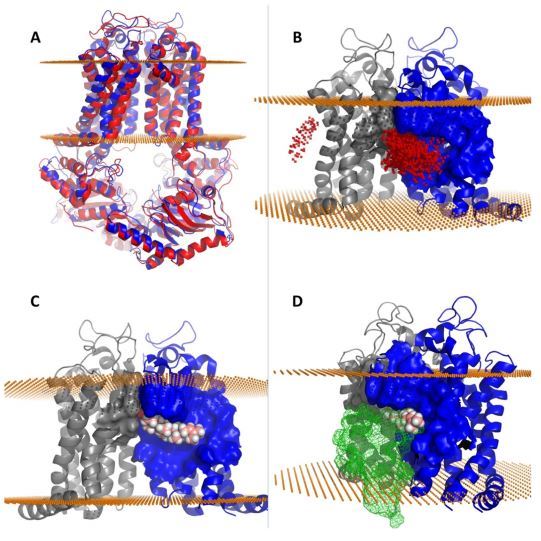Introduction of ABCG4
ABCG4, ATP-binding cassette subfamily G member 4 is a protein that in humans is encoded by the ABCG4 gene. The protein encoded by this gene is included in the ATP-binding cassette transporter (ABC protein) superfamily. ABC proteins transport various molecules across extra- and intra-cellular membranes. ABC genes are divided into seven distinct subfamilies (ABC1, MDR/TAP, MRP, ALD, OABP, GCN20, White). This protein is a member of the White subfamily and is expressed predominantly in liver tissue.
| Basic Information of ABCG4 | |
| Protein Name | ATP-binding cassette sub-family G member 4 |
| Gene Name | ABCG4 |
| Aliases | WHITE2 |
| Organism | Homo sapiens (Human) |
| UniProt ID | Q9H172 |
| Transmembrane Times | 6 |
| Length (aa) | 646 |
| Sequence | MAEKALEAVGCGLGPGAVAMAVTLEDGAEPPVLTTHLKKVENHITEAQRFSHLPKRSAVDIEFVELSYSVREGPCWRKRGYKTLLKCLSGKFCRRELIGIMGPSGAGKSTFMNILAGYRESGMKGQILVNGRPRELRTFRKMSCYIMQDDMLLPHLTVLEAMMVSANLKLSEKQEVKKELVTEILTALGLMSCSHTRTALLSGGQRKRLAIALELVNNPPVMFFDEPTSGLDSASCFQVVSLMKSLAQGGRTIICTIHQPSAKLFEMFDKLYILSQGQCIFKGVVTNLIPYLKGLGLHCPTYHNPADFIIEVASGEYGDLNPMLFRAVQNGLCAMAEKKSSPEKNEVPAPCPPCPPEVDPIESHTFATSTLTQFCILFKRTFLSILRDTVLTHLRFMSHVVIGVLIGLLYLHIGDDASKVFNNTGCLFFSMLFLMFAALMPTVLTFPLEMAVFMREHLNYWYSLKAYYLAKTMADVPFQVVCPVVYCSIVYWMTGQPAETSRFLLFSALATATALVAQSLGLLIGAASNSLQVATFVGPVTAIPVLLFSGFFVSFKTIPTYLQWSSYLSYVRYGFEGVILTIYGMERGDLTCLEERCPFREPQSILRALDVEDAKLYMDFLVLGIFFLALRLLAYLVLRYRVKSER |
Function of ABCG4 Membrane Protein
ABCG4, ATP-binding cassette sub-family G member 4 belongs to the ABCG subfamily, the members of which are half transporters composed of a single trans-membrane and a single nucleotide-binding domain. It is an ATP-binding cassette trans-membrane protein which has been shown, in vitro, to participate in the cellular efflux of desmosterol and amyloid-β peptide (Aβ). ABCG4 is highly expressed in the brain and is predominantly localized to the plasma membrane, and it may function in vivo to export Aβ at the blood-brain barrier (BBB), in a process that can be antagonized by its putative natural ligand, desmosterol (and possibly cholesterol). Also, it may be involved in macrophage lipid homeostasis. Some studies indicate that ABCG4 promote cholesterol efflux from cells to high-density lipoprotein (HDL). ABCG4-induced apoptosis may implicate a new role for this protein in the clearance mechanisms within the central nervous system.
 Fig.1 Computed structural and binding features of the Abcg4 dimer model. (Dodacki, 2017)
Fig.1 Computed structural and binding features of the Abcg4 dimer model. (Dodacki, 2017)
Application of ABCG4 Membrane Protein in Literature
This article shows for the first time that ABCG4 may function in vivo to export Aβ at the blood-brain barrier (BBB), in a process that can be antagonized by its putative natural ligand, desmosterol (and possibly cholesterol).
This article briefly summarizes the role of ABC transporters including ABCG4 in the pharmacokinetics and disposition of drugs frequently used to treat CVD and CVD-related complications.
This study indicates that ABCG4 is predominantly expressed in microglial-like cells and endothelial cells in the brain, our finding of ABCG4-induced apoptosis may implicate a new role for this protein in the clearance mechanisms within the central nervous system.
This article suggests that ABCG1 and ABCG4 alter the distribution of γ-secretase on the plasma membrane, leading to the decreased γ-secretase activity and suppressed Aβ secretion. ABCG1 and ABCG4 may inhibit the development of Alzheimer's disease and can be targets for the treatment of Alzheimer's disease.
This report indicates that all apoE forms affected Aβ production/oligomerization and BACE1 levels in a pattern that did not follow that of their capacity to promote ABCG1, ABCG4 or SR-BI-mediated cholesterol efflux. Overall, the data indicate that apoE-containing lipoprotein particles can have a direct effect on BACE1 levels and Aβ secretion and possibly contribute to AD pathogenetic processes, independently of their capacity to promote cholesterol efflux.
ABCG4 Preparation Options
We provide custom membrane protein preparation services for worldwide customers. Leveraging by our advanced Magic™ membrane protein production platform, we are able to present target membrane protein in multiple active formats. Our professional scientists are happy to help you find an ideal method and make your project a success. Aided by our versatile Magic™ anti-membrane protein antibody discovery platform, we also provide customized anti-ABCG4 antibody development services.
Creative Biolabs provides high-quality membrane protein preparation service to facilitate the development of worldwide customer’s research. During the past years, we have successfully established a powerful Magic™ membrane protein platform which enables us to provide a series of membrane protein preparation services. For more detailed information, please feel free to contact us.
Reference
All listed services and products are For Research Use Only. Do Not use in any diagnostic or therapeutic applications.